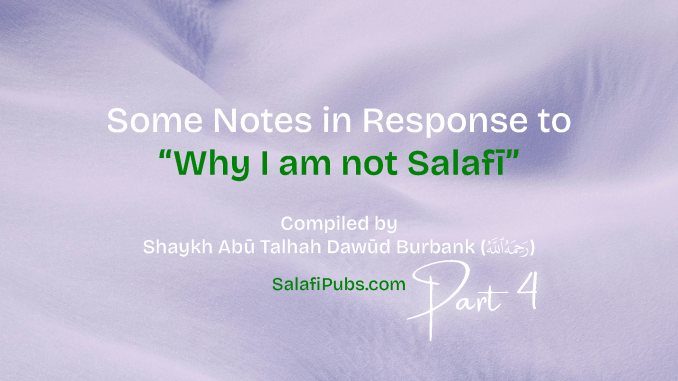
Shaikh Ibn Bāz (may Allāh have mercy on him) affirming ‘Al-Hadd’ for Allāh (the Most High)
As for the Statement attributed to Shaikh Ibn Bāz (may Allāh have mercy on him) in his Notes upon ‘Al-ʿAqīdah At-Tahāwiyyah’ concerning attributing a ‘hadd’ to Allāh (the Most High).
[01] — Then Imām Ad-Dārimī (d. 266H — may Allāh have mercy on him) pointed out that the first person to deny the like of this was the great deviant Al-Jahm ibn Safwān — after whom the Jahmiyyah sect are named.
Ad-Dārimī said in his refutation of Bishr Al-Marīsī (2/223): “And the opposer also claimed that there is no ‘hadd’, not any ‘ghāyah’, nor any ‘nihāyah’ for Allāh. So this was the foundation upon which Jahm built all of his misguidance, and from which he extracted all of his grave errors, and it is a saying which it has not reached us that anyone from the creation said it prior to Jahm,
So someone who discusses with him said: ‘I know what your intention is by this, O non-Arab — you mean that Allāh is nothing, since the whole of the creation know that there is nothing which has the title of being something except that it has a ‘hadd’, a ‘ghāyah’ and attributes; and that there is nothing which does not has a ‘hadd’, a ‘ghāyah’ and attributes. So something will always and must-have attributes, and there is nothing having attributes which is without a ‘hadd’ and a ‘ghāyah’, and your saying that He has no ‘Hadd’ means that He is nothing!’
Abū Saʿīd (Ad-Dārimī) said: And Allāh (the Most High) has a ‘Hadd’ which is not known to anyone besides Him; and it is not permissible for anyone to falsely imagine himself a limit His ‘Hadd’; rather he believes in the ‘hadd’ and entrusts where He is, and He is upon His Throne (ʿArsh), above the heavens, So there are two hadds.”
[02] — Shams-us-Salafī Al-Afghānī (may Allāh have mercy on him) said in his book ‘Al-Māturīdiyyah’ (2/582-584): “The wording ‘Al-Hadd’ is used with two meanings:
[firstly] — With the wording of encompassing Allāh with knowledge. So there is no doubt that ‘Al-Hadd’ with this meaning is negated for Allāh (the Most High), there being no argument between the people of the Sunnah concerning that. Since Allāh (the Most High) cannot be encompassed, and the creation are unable to encompass Him.
So with this meaning, we are to understand the saying of those from the Salaf who denied ‘Al-Hadd’.
[and secondly] — With the meaning that Allāh (the Most High) is distinct from His creation, separate from them, apart from them, above them, not mixed amongst them, and not within them. So this meaning is true.
So ‘Al-Hadd’ with this meaning is such that it is not permissible to dispute about it, since denying it will only amount to denying the existence of the Lord, and denying His reality. So this is the meaning we are to understand from the saying of those of the Salaf who affirmed ‘Al-Hadd’ for Allāh (the Most High).”[1]
So therefore we see many of the Salaf — such as Sufyān Ath-Thawrī, Shuʿbah, Hammād ibn Zayd, Hammād ibn Salamah, Sharīk, Abū ʿAwānah, Abū Dāwūd At-Tayālisī, At-Tahāwī and others denying ‘Al-Hadd’.
This also occurs in one narration from Imām Ahmad. Alongside this we also see many of the Salaf affirming ‘Al-Hadd’ for Allāh (the Most High), such as ʿAbdullāh ibn al-Mubārak — and the Hanafīs take him to be a Hanafī — and it is a narration from Imām Ahmad[2], and Imām ʿUthmān Ad-Dārimī and others.
So those who negate ‘Al-Hadd’ intended the first meaning which is futile and must be negated for Allāh (the Most High), and those who affirmed ‘Al-Hadd’ intended the second meaning which is true and which a person must have Īmān in — which is ‘Al-ʿUluww’ (Allāh’s Highness and Exhaltedness).
However, the major problem is that groups of those who negate Allāh’s attributes enter into ‘Al-Hadd’ both truth and falsehood, and then they deny it altogether. So within their denial they deny that Allāh (the Most High) is above His Servants, and is above His Throne.
Imām Adh-Dhahabī (d. 748H) said: “Abul-Qāsim At-Taymī (d. 535H — may Allāh have mercy on him) was asked: ‘Is it permissible to say that there is a ‘hadd’ for Allāh or not? And did the Salaf disagree about this?’ So he responded: “I seek to be excused from answering this question because of its obscurity, and because of my lack of awareness of that the questioner intends by it.
However, I will indicate some of what has reached me. The people of realities have spoken in explanation of ‘Al-Hadd’ with various wordings, which in summary affirms that the ‘hadd’ of everything is the place of its separatedness from others than it. So if the questioner intends by Allāh’s not having a ‘hadd’ is that the knowledge of religious realities does not encompass Him, then he is correct.
However, if he intends by that to say that His Knowledge (He, the Most High) does not encompass Himself, then he is a person astray, or if his intention is that Allāh Himself is in every place, then he is also astray.”[3]
[03] — As for At-Tahawī (may Allāh have mercy on him), then he used an non-specific term for denial for ‘Al-hadd’ which is why Shaikh Ibn Bāz (may Allāh have mercy on him) clarified the matter by saying:
“So what he meant by ‘Al-hudūd’ (pl. of Al-hadd) is those known to mankind, since He (the One free of all imperfections) none knows His ‘hudūd’ except He (the One free of all imperfections), because the creation cannot encompass Him in knowledge, just as He (the Mighty and Majestic) said in Sūrah Tā-Hā:
يَعْلَمُ مَا بَيْنَ أَيْدِيهِمْ وَمَا خَلْفَهُمْ وَلَا يُحِيطُونَ بِهِ عِلْمًا
[meaning:] “He Knows whatever lies in front of them and whatever is behind them, but they do not encompass Him in knowledge.” — Sūrah Tā-Hā (20): 110
And whoever from the Salaf affirmed ‘Al-Hadd’ with regard to ‘Al-Istiwāʾ’ (Allāh’s having Ascended) or regarding other than it, then what he meant was a ‘hadd’ which Allāh (the One free of all imperfections) Knows, and which is not known to His servants.”
Translated by Abū Ṭalḥah Dāwud Burbank.
[1] ‘Darʾut-Taʿārud’ of Shaikh-ul-Islām (2/33-35) and ‘Sharh At-Tahāwiyyah’ of Ibn Abil-ʿIzz (239-240).
[2] Reported by Al-Khallāl as occurs in ‘Darʿut-Taʿārud’ (2/34).
[3] ‘Siyar Aʿlām-in-Nubalāʾ’ (20/80-88).
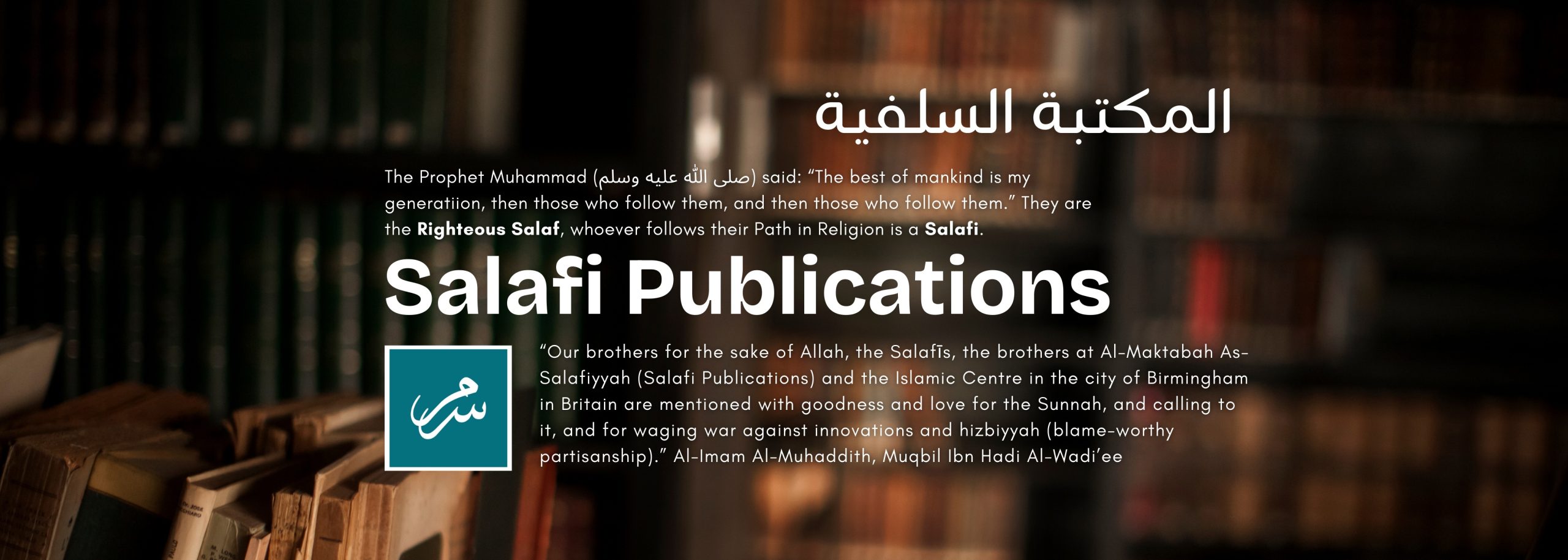
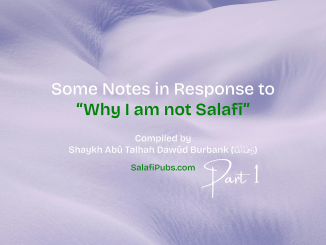
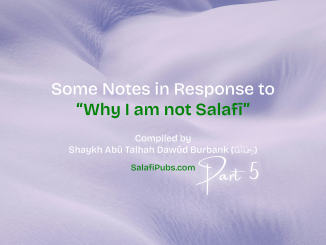
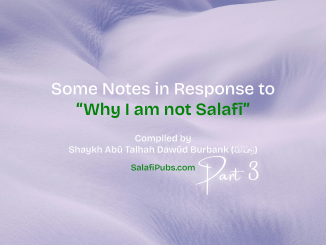
Be the first to comment